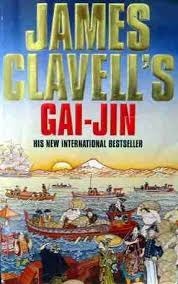Take a photo of a barcode or cover
adventurous
dark
informative
sad
medium-paced
Plot or Character Driven:
A mix
Strong character development:
Yes
Loveable characters:
Complicated
Diverse cast of characters:
Yes
Flaws of characters a main focus:
Yes
Another excellent novel in this "Asian Saga." Here, we are back in Japan, in the early 1860s. Admiral Perry has recently opened up Japan after a couple of hundred years of isolation under the Shogunate.
The Japanese are mired in the decadence of the Shogunate, which has had its powers eroded since Toranoga (in Clavell's fiction Japan) consolidated his power in Shogun. In the meantime, the West has established its trading post which is dominated by the Straun's and the Noble House, whose rise was central to Tai-Pan. Thus, the characters from the earlier books haunt this one, even though none of them actually arrives on the scene of the action.
This book is less centrally focused than either Shogun or Tai-Pan. It has a host of characters and interweaves more plots than either of those did. Clavell does the multi-POV routine very well, and he is pretty adept at having you understand, and perhaps even sympathize, with people on the opposite sides of a conflict. There are quite a few times here that I found myself rooting, for lack of a better word, for characters who I knew were pretty terrible people.
This is especially true of the lead Japanese Ronin, who is a zealot and an assassin who happily uses other people to achieve his ends. It's also true of the French spy, who is totally a manipulative bastard, but still somehow likable.
Reading this, and being subject to my own prejudices, I assumed that one of the characters we were following was the main character of the book. And then, in a fairly stunning (but also satisfying) twist, it turns out that I was completely wrong. I should have seen that another person had been the main character of that thread (and possibly the entire novel) all along. And from the beginning it had been fairly obvious, if I had read with a more open mind (or maybe with a mind that did not assume a kind of narrative prejudice on Clavell's part.)
Overall, I think this book is almost on the same level as the first two. I can understand why some people are satisfied and stop after Shogun. Once through Tai Pan however, it makes no sense at all to me to stop. This is perhaps less thematically deep than the first two, but it makes up for that in other kinds of complexity, and I think, in a better balance of understanding of both the Japanese, the Chinese servants, and the Western traders. (For example, we don't have a mention of seppeku on every third page in this book, like Shogun; and the Japanese are true players in this book, unlike the Chinese in Tai Pan, who were more or less inscrutable enemies, with a very few exceptions.)
I don't know whether to read King Rat next, or skip over to Noble House, which clearly promises to be a continuation of this fictional world.
The Japanese are mired in the decadence of the Shogunate, which has had its powers eroded since Toranoga (in Clavell's fiction Japan) consolidated his power in Shogun. In the meantime, the West has established its trading post which is dominated by the Straun's and the Noble House, whose rise was central to Tai-Pan. Thus, the characters from the earlier books haunt this one, even though none of them actually arrives on the scene of the action.
This book is less centrally focused than either Shogun or Tai-Pan. It has a host of characters and interweaves more plots than either of those did. Clavell does the multi-POV routine very well, and he is pretty adept at having you understand, and perhaps even sympathize, with people on the opposite sides of a conflict. There are quite a few times here that I found myself rooting, for lack of a better word, for characters who I knew were pretty terrible people.
This is especially true of the lead Japanese Ronin, who is a zealot and an assassin who happily uses other people to achieve his ends. It's also true of the French spy, who is totally a manipulative bastard, but still somehow likable.
Reading this, and being subject to my own prejudices, I assumed that one of the characters we were following was the main character of the book. And then, in a fairly stunning (but also satisfying) twist, it turns out that I was completely wrong. I should have seen that another person had been the main character of that thread (and possibly the entire novel) all along. And from the beginning it had been fairly obvious, if I had read with a more open mind (or maybe with a mind that did not assume a kind of narrative prejudice on Clavell's part.)
Overall, I think this book is almost on the same level as the first two. I can understand why some people are satisfied and stop after Shogun. Once through Tai Pan however, it makes no sense at all to me to stop. This is perhaps less thematically deep than the first two, but it makes up for that in other kinds of complexity, and I think, in a better balance of understanding of both the Japanese, the Chinese servants, and the Western traders. (For example, we don't have a mention of seppeku on every third page in this book, like Shogun; and the Japanese are true players in this book, unlike the Chinese in Tai Pan, who were more or less inscrutable enemies, with a very few exceptions.)
I don't know whether to read King Rat next, or skip over to Noble House, which clearly promises to be a continuation of this fictional world.
Overall, this book could have been 300-500 pages shorter. There were points of intrigue and excitement; however, Clavell had a harder time with character development in this novel compared to "Shogun" and "Tai-Pan." I felt that Clavell tried especially hard to tie characters in this novel to preceding novels (and presumably later in Noble House and possibly King Rat), but that effort largely fell flat.
The time period in pre-Meiji Japan and at the fall of the Tokugawa Shogunate is certainly interesting, and if one is reading the rest of Clavell's Asian Saga then it makes sense to read this as well. That being said, I can't say that I would recommend this novel to others as a stand-alone novel (unlike that of Shogun and Tai-Pan, which could be considered such).
The time period in pre-Meiji Japan and at the fall of the Tokugawa Shogunate is certainly interesting, and if one is reading the rest of Clavell's Asian Saga then it makes sense to read this as well. That being said, I can't say that I would recommend this novel to others as a stand-alone novel (unlike that of Shogun and Tai-Pan, which could be considered such).
Clavell is an incredible writer. Unfortunately that means when he is writing about the sheer human misery of various people it is something you really fell. I got about half way through the book and had to put it down for a while. I tell myself I will pick it up again, its a great book, but I have not yet had the fortitude
adventurous
challenging
dark
medium-paced
Plot or Character Driven:
Plot
Strong character development:
Yes
Loveable characters:
Complicated
Diverse cast of characters:
Yes
Flaws of characters a main focus:
Yes
Okay. I give up. I can't stick it out. I set it down and never want to go back to it. Time to stop.
adventurous
challenging
informative
tense
medium-paced
adventurous
reflective
medium-paced
Plot or Character Driven:
A mix
Strong character development:
Yes
Loveable characters:
Complicated
Diverse cast of characters:
Yes
Flaws of characters a main focus:
Yes
While not on par with Shogun, Tai-Pan, or King Rat, I will say this picked up incredibly at the end. A common thread with his first three books is that they are all page turners throughout that I was never bored of reading, but all end very abruptly. Gai-Jin feels like the opposite - I wasn't always in love with the story or characters and was downright bored/tuned out at times. However, it all comes together in an epic, stunning conclusion that is very rewarding if you've made it through this far. This book surely could have been trimmed down and been stronger, but the conclusion (maybe the last quarter of the book?) raises a 2.5 up to a 3.5.
Kind of let down after Shogun and Tai-Pan, it lacked the character depth of those two books. No one really stood out as an anchor for the story, the way Blackthorn and Dirk Struan did. With no one to root for, there was not much pulling me along towards the end. It still felt like the story was accelerating, but it was being laboriously pushed along, rather than sailing on its own. 3.5⭐
Purtroppo questo terzo libro è per me un grosso NO.
E mi dispiace, perché come sempre l'ambientazione era ottima e le possibilità c'erano.
Ma non so.
Sarà che il ritmo della storia era lentissimo, saranno i personaggi che non mi hanno preso per niente, sarà che l'unico interesse che ho trovato era nelle lotte politiche giapponesi, sarà che l'arrivo di un Deus Ex-Machina enorme mi ha deluso enormemente.
So solo che per buona parte del libro la lettura si è trascinata stancamente, senza interesse, e solo nel finale le cose sono tornate a scorrere più o meno agilmente.
Un vero peccato, dopo Shogun e Tai Pan.
E mi dispiace, perché come sempre l'ambientazione era ottima e le possibilità c'erano.
Ma non so.
Sarà che il ritmo della storia era lentissimo, saranno i personaggi che non mi hanno preso per niente, sarà che l'unico interesse che ho trovato era nelle lotte politiche giapponesi, sarà che l'arrivo di un Deus Ex-Machina enorme mi ha deluso enormemente.
So solo che per buona parte del libro la lettura si è trascinata stancamente, senza interesse, e solo nel finale le cose sono tornate a scorrere più o meno agilmente.
Un vero peccato, dopo Shogun e Tai Pan.

